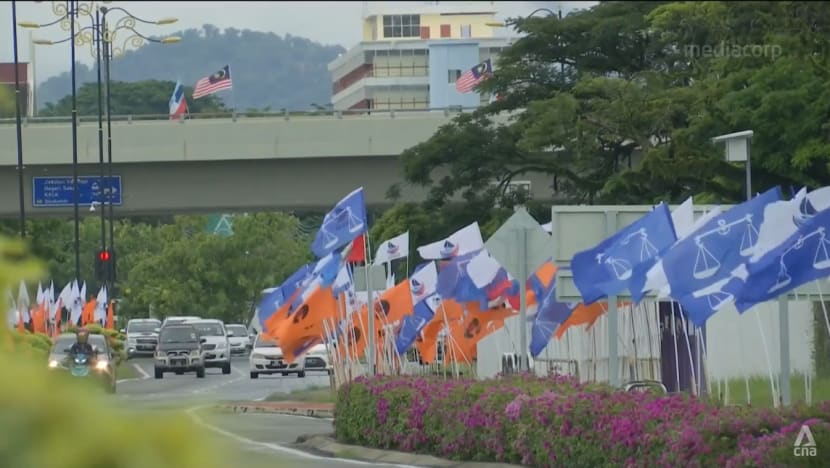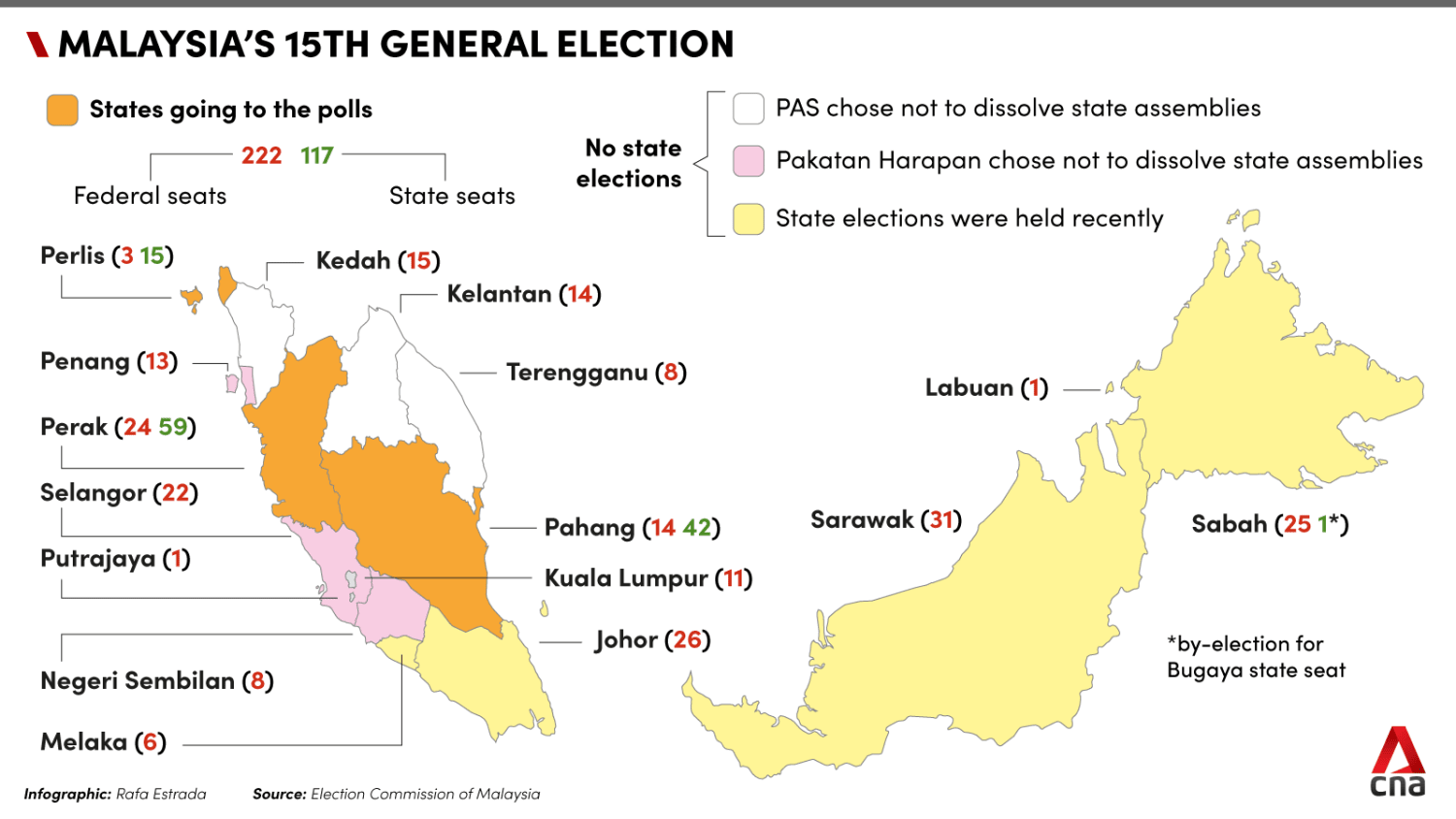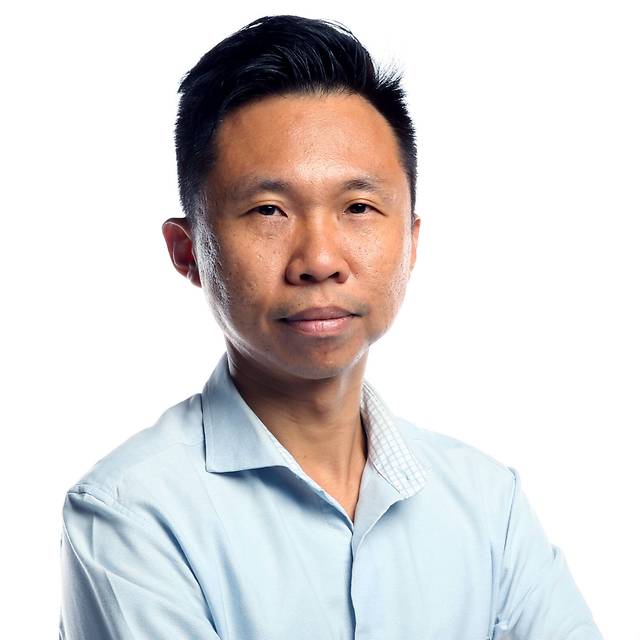Malaysia GE15: Borneo states Sabah and Sarawak can unite to have political leverage, but differing dynamics could be an obstacle
The formation of a bloc could push the federal government to give the two states greater autonomy and a higher revenue share from their oil and gas resources.

The Borneo states of Sabah and Sarawak together hold a quarter of Malaysia’s parliamentary seats.
MALAYSIA: The Borneo states of Sabah and Sarawak, which together hold a quarter of Malaysia’s parliamentary seats, can have a bigger say in government matters if they can form a united bloc, analysts said ahead of the country’s 15th General Election on Saturday (Nov 19).
This would mean being more effective in pushing the federal government to give the two states greater autonomy and a higher revenue share from their oil and gas resources, which bring in major revenues for the country.
Dr James Chin, Professor of Asian Studies at the University of Tasmania, said the rationale behind a “United Borneo Front” would be bringing together the number of seats they jointly have in parliament to increase their political leverage in Putrajaya.
It is also about securing development funds, so they can develop both states and provide their people with a higher standard of living, he told CNA.
So far, Sarawak has managed to have a louder voice.
Its state government - ruled by the Gabungan Parti Sarawak (GPS) - fought for a 5 per cent sales tax on petroleum products.
The chief minister of Sarawak is also now called the Sarawak premier, after the state passed an amendment Bill in February this year, reflecting another step taken towards regaining more of Sarawak's rights.
"Sarawak is so successful in getting concessions from (Putrajaya) under GPS, they're highly united. They're all Sarawak-based parties,” said Prof Chin.
The message this sends to Putrajaya is that if Sarawak is not given concessions, they may look at secession, a possibility that worries the federal government, he added.
IS A UNITED FRONT POSSIBLE?
Over in Sabah, it is a different political landscape, with the ruling coalition Gabungan Rakyat Sabah (GRS) made up of Bersatu and Barisan Nasional (BN). This is a unique relationship, given that in Peninsular Malaysia, both parties are at loggerheads.
While the advantages of such a united front are clear, whether it can happen is another matter, said one analyst.
"I think even to just have a united front for either Sabah or Sarawak will be very difficult because they have their respective political dynamics … (It) will be very difficult for them to interact with one another, not to mention Sabah and Sarawak combining together,” said Dr Oh Ei Sun, a senior fellow at the Singapore Institute of International Affairs.
“Even if Sabah and Sarawak were to be united and to have a front together, I think that doesn't necessarily mean that the politicians involved in this ‘United Borneo Front’ would be all fighting for the rights of Sabah and Sarawak."
The formation of a Borneo bloc comprising federal members of parliament from Sabah and Sarawak is possible, if Sabahans vote for local parties in the election, said president of Sabah’s biggest opposition party Parti Warisan (Warisan), Mr Shafie Apdal.
Speaking during a campaign event in Kota Kinabalu on Monday (Nov 14), the former chief minister said that cooperation between Warisan and GPS is possible to realise the regional bloc.
Warisan aims to win big at this election, a move that may allow it to work with Sarawak's winning coalition.
PROBLEMS IN SABAH
In Sabah in particular, one key gripe among the people is the lack of development as compared to Peninsular Malaysia.
For instance, all states in West Malaysia are linked by a highway - built in the 1980s. However, there are none in the Borneo states.
They also think the federation has not delivered on two main promises made in 1963 during the formation of Malaysia - high levels of autonomy and economic development.
"In the case of Sabah voters, I suspect there's a lot of unhappiness. They have not seen any new money coming into Sabah, so that's the anti-federal side. At the local level, there's also unhappiness that all the key political actors in Sabah can't get their act together,” said Prof Chin.
Compared to Sarawak, Sabah got less concessions from the federal government.
There is also a lack of development in many rural areas, and candidates hoping to win over voters need to address them.
For instance, in a floating village in Semporna, residents have to tap on three wells in a forest.
There is only one school in the village and the nearest clinic with basic facilities is about 6km away. Villagers have often griped about not having proper roads, bridges and basic amenities.

Despite their problems, the Borneo states’ importance in the upcoming election is becoming more apparent.
Pakatan Harapan (PH) leader Anwar Ibrahim is hoping to form a state-federal team to defend the interests of all Sarawakians.
Apart from Mr Anwar, the leaders of major coalitions from peninsular Malaysia have each visited either Sabah or Sarawak ahead of the general election.
They include BN’s Ahmad Zahid Hamidi and Ismail Sabri Yaakob, as well as Gerakan Tanah Air’s Mahathir Mohamad - clear signs that these leaders see the value of the Borneo states as kingmakers, after the election.


















